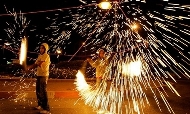Everything was ready to welcome the group of Americans and one Canadian coming to help with the construction of the kindergarten in Al Aqabah, the little village struggling to come back to life.
The sixty little children had practiced their welcoming song, and the less shy ones were assigned the task of offering individually wrapped flowers for each of the guests. The mayor had ordered lunch delivered to the school from a restaurant in the nearby village of Tubas. (Al Aqabah does not have a restaurant.) Palestinian volunteers were on hand to join in the work. A photographer/videographer was on his way from Jerusalem to record the joyful event.
The morning mist had lifted, and the sunny weather seemed a good omen. Best of all, all was quiet at the army training camp at the foot of the hill. We were full of excitement.
By mid-morning the telephones started to ring, bringing nothing but bad news. Checkpoints were closed. Soldiers were not making any exceptions. "No tourist allowed to enter the territory." Jerusalem was on high alert. Again. The photographer was turned away. Our group traveling on a small bus was turned away. Not willing to give up, local people gave instructions on how to take back roads to avoid established checkpoints. We stared at one another while the tension mounted.
To make matters worse, the cell phones often brought garbled or incomprehensible messages, or one could not get reception.
It was noon by the time the group drove to the checkpoint on the back road only a few miles from the kindergarten. When they were again denied passage, we decided that I would try to intercede in person. After all, I had been successful on Friday. Surely the soldiers would listen to reason.
We drove to the checkpoint, and I walked not overly confident but full of hope toward the soldiers, passport in hand. The bus with the group was parked only a few meters away, on the other side. Only the guide and the group leader were allowed off the bus. We greeted one another, maintaining our distance.
Three soldiers were on duty in the small booth in the middle of the road, one of them in shorts and an army undershirt. He was the only one who spoke both Arabic and English in addition to Hebrew. He was engaged in a drawn-out argument with a young couple with two small children. While he argued with the husband, the young woman and her children were ordered to stand in the noon sun on the side of the road. The soldier would alternatively talk with me and argue with the young Palestinian. We seemed to go around in circles.
Cars and trucks coming from Jenin started lining up. No one paid them any attention. I was asked to move to the side of the road. I was blocking their view, the soldier said. It made me laugh.
After a good hour of waiting I was permitted to walk to the bus to greet the group while my passport rested on a ledge of the army booth. We were waiting for an answer from "a higher officer" I was told. Still confident that reason would prevail, I left the group after a short visit promising to see them "on the other side."
Soldiers came and went, taking time to eat, drink and talk with each other, arguing with the Palestinian and looking through me, pretending I was not there. I waited. I sat on a cement block, removed my socks, wiggled my toes and put my sandals back on. I waited.
The English speaking soldier left but returned after half an hour in full uniform. "Are we making progress?" I asked him. "Progress?" he asked in return. Israeli soldiers are probably the best trained people in the world to go from speaking English like natives to not understanding a single word. I quietly addressed him again, assuring him that we were not on a sight-seeing tour; we were not going to Jenin; we had lunch waiting for us. We would have lunch, visit with the people and come back through the same checkpoint, I promised. The bus could stay where it was. The group could walk across, and we would take them to the site with our van. The soldier grinned as if I had said something funny and shook his head. "Please try to call your superior officer!" I pleaded. "I did. He said no" he replied. "Please try again. Call his superior officer." I insisted. He picked up the phone, and I moved away.
Time ticked by. The young woman and the children were finally invited by a newly arrived soldier to stand in the small shade created by the booth. I waited in the sun.
Time ticked by. Finally I approached the soldier again. "Did you get an answer yet?" "Yes, and the answer is NO." "Then why not tell me?" I said raising my voice. "Why let me wait here for nothing? Why the rudeness?" He shot back, "I don't care if you want to wait here until night. The answer is still no."
At this point I accepted defeat. I asked for my passport, went to collect my overnight bag and hugged my patient friends who had been watching helplessly from a distance. I hid my eyes behind sun glasses and with angry tears running down my face, I crossed the checkpoint one last time, turning my head away from the soldiers. They would NOT see me cry.
The woman and the children were now standing in the sun again. The young man was still arguing with the soldier.
I boarded the bus for the return trip to Jerusalem, devastated by what I considered a personal failure.





